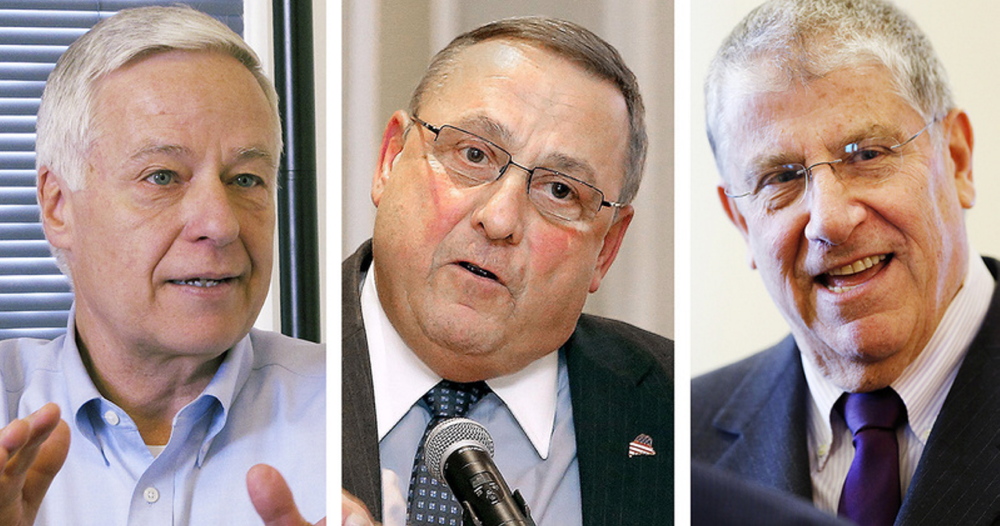This year’s governor’s race is already the most expensive in Maine history, and we have more than a month to go before Election Day.
That’s something we should get used to: The record is destined to get smashed every election cycle since the Supreme Court passed a series of freedom-of-speech decisions that allow essentially unlimited spending in races by wealthy individuals and corporations as long as the spending is done outside of campaign organizations.
But just because it has become predictable, it shouldn’t be any less shocking. This escalation distorts our politics and contributes to polarization and dysfunction, and it may take a constitutional amendment to stop this spiral.
Just like the election cycles in 2010 and 2012, the driving force is unlimited money from outside groups that pay for advertising and canvassers to promote candidates for the Blaine House and the Legislature.
The numbers are staggering: The governor’s race alone has topped $4.2 million, already passing the $4 million spent by similar groups in 2010.
Unlike much of what goes on in our politics, this is essentially a bipartisan affair, with both Democratic and Republican groups buying ads in Maine television markets. That’s in addition to the combined $6.7 million raised by the campaigns of Gov. LePage, Democrat Mike Michaud and independent Eliot Cutler.
The two party candidates are getting about the same support from the outside groups, but just because the numbers are fairly even doesn’t make the spending benign.
As this escalates, neither party will stop and independents won’t be able to compete unless they are personally rich enough to keep pace.
The Supreme Court has found that as long as the expenditures on behalf of a candidate are not meant as a bribe, they should be considered free speech. But we don’t need campaign finance laws to protect us from bribery – that’s always been illegal. We need laws to prevent the other ways that money distorts the way that government works. Just a few people can make huge donations to outside groups that dwarf the $3,000 limit for individual contributions to gubernatorial candidates. The largest donors will have larger influence with future officeholders, even if the candidate doesn’t pocket the cash.
Candidates know what these interests are doing on the candidate’s behalf. It’s natural to expect that knowledge to affect the kinds of policies they propose in office.
And once on the job, the officeholders will have to wonder if the millions of dollars that helped get them elected could be used against them if they say or do something counter to those interests.
We have seen how this plays out in Washington, where members of Congress find ideological purity to be the safest position and compromise to be potentially fatal to their careers. This has led to dysfunction and frustration with our national government.
This could be especially destructive in Maine, where budgets and some other legislation require two-thirds majority votes. People have to work together here, regardless of their party affiliation, or the system won’t work.
Government cannot be expected to work for the people with this level of campaign spending done by only a few. As income inequality expands, the people who are benefiting the most from current economic policies are also the ones whose money gives them the most influence on the development of those policies.
There is a name for government by the rich – plutocracy – and it’s not what our Founding Fathers were trying to create when they guaranteed our freedom of speech. We should have a system in which the voices of the many can act as a balance against the influence of a few people’s wealth.
There has to be a way to slow down the money flow and make sure that more than just the richest voices have a chance to be heard if our democracy is going to survive.
Send questions/comments to the editors.



Success. Please wait for the page to reload. If the page does not reload within 5 seconds, please refresh the page.
Enter your email and password to access comments.
Hi, to comment on stories you must . This profile is in addition to your subscription and website login.
Already have a commenting profile? .
Invalid username/password.
Please check your email to confirm and complete your registration.
Only subscribers are eligible to post comments. Please subscribe or login first for digital access. Here’s why.
Use the form below to reset your password. When you've submitted your account email, we will send an email with a reset code.